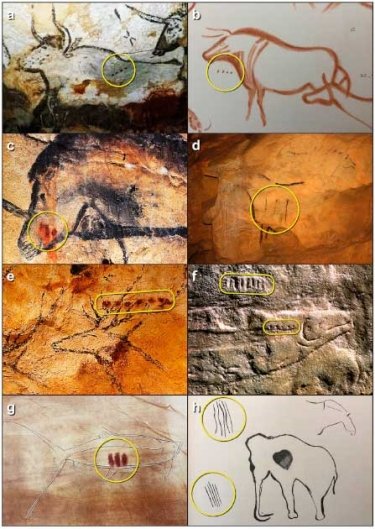Do the Lascaux Paintings Feature 21,500-Year-Old Writing?
Lascaux, Paleolithic Art, Theories, Writing

Examples of animal depictions associated with sequences of dots/lines. (a) Aurochs: Lascaux, late period; (b) Aurochs: La Pasiega, late; (c) Horse: Chauvet, late (we differ in opinion with the Chauvet team, for whom it would be early); (d) Horse: Mayenne-Sciences, early; (e) Red Deer: Lascaux, late; (f) Salmon: Abri du Poisson, early; (g) Salmon (?): Pindal, late; (h) Mammoth: Pindal, early.
It looks plausible that the lines and dots repeated on, or beside, multiple images of the same animals may possibly have been placed there to communicate some information to hunters. (link)
The First known Writing In Humankind?
The 21,500-year-old ‘controversial’ cave painting depicts the now extinct auroch bull. The new study instigated by furniture conservator Bennett Bacon and in collaboration with academics from the University of Durham was published on Jan. 5 in the Cambridge Archaeology Journal. As an example, it specifically looks at four dots on a painting of an auroch within the overall design at Lascaux. The writers of the study say the dots and lines “might relate to the seasonal behavior of prey animals.” If they are right, and this design conveys seasonal data, these dots and lines do indeed represent the earliest form of writing ever discovered in the history of humankind.
Similar groups of dots and lines have been found in hundreds of hunter-gatherer cave sites across Europe. The team of researchers maintains that when positioned near animal imagery the “apparently” abstract groups of dots and lines actually represent “a sophisticated writing system.” The team speculated that this early form of communicating seasonal information is related to hunter’s “understanding of the mating and birthing season of important local species”.




